Jurassic Park is special. And that’s a weird thing to get into because we don’t normally give high marks to popcorn films on principle. It’s seems unfair when they’re designed to engage us in a primal place, our most base emotions, to make us gasp and shriek and laugh in a darkened theater of strangers.
So the most obvious question becomes: what makes Jurassic Park special? Why this monster movie above so many others? (The answer is not simply “dinosaurs!” for everyone itching to say so. There have been many bad dinosaur movies. So many.)
This movie came out when I was a pretty young kid, and not the sort of kid who handled scary movies well. But I begged to see it—I’m sure plenty of kids from my generation remember doing the same. My parents (like many others, I have stats on this) kept my eyes covered for the opening raptor-mauling scene, and I know they were expecting to drag me out in tears. I half expected it myself. And I couldn’t really tell you what made me leave that theater with a sense of adoration that nostalgia would only strengthen as years went by. I can only tell you that nostalgia isn’t what makes this movie good.
As with all films that demand attention, Jurassic Park is a perfect storm of serendipity and movie science, a lot of smart decisions made alongside random acts of aren’t-we-lucky. It’s amazing that we got this movie. If the script hadn’t been overhauled or the effects hadn’t taken a few bounding leaps ahead of their time or the actors had refused to take the film seriously, it would have been lucky to get a cult following. But the world was ready for Jurassic Park, and so it was bequeathed to us, accompanied by a score by John Williams that can only be described as flipping majestic. (Really, without that soundtrack, I guarantee that the film would have a quarter of the impact. It has such a breathtaking effect that it might even outrank his Indy and Star Wars themes for sheer transformative power.)
You know what’s incredible about Jurassic Park? People spend the ENTIRE MOVIE discussing the ethics of what is happening on the island. The whole thing. It doesn’t stop after the first act, it doesn’t happen a couple times between one long action sequence of a movie. The whole film is about this discussion. This man-vs-nature do-we-have-the-right-to-play-God hypothesis. The dinosaurs show up for a grand total of fifteen minutes of screen time. Do you realize how rare that is these days? A modern blockbuster would give you three micro-scenes of chit-chat, max. And even then, it would only be to make certain that the film had a “theme” that all the action could turn on. Window dressing to support and center set pieces.
When you’re watching Jurassic Park, you can’t help but feel that the people making the movie, I don’t know, cared about the questions they were posing. They cared enough to make it clear that you shouldn’t create a backdrop of bioengineering and genetic hopscotch without expecting some questions in return. The film treated its audience as though they were as smart as the team of scientists sent to evaluate the park. As though your average moviegoer should feel free to air their opinions on cloning and rights to creation and social responsibility. We have to assume that the only reason Hollywood put up money for this is because the person who sold it in the studio exec office left their elevator pitch at “Dinosaur amusement park where people go to die” and omitted the rest.
Michael Crichton was responsible for the original script, which read very much like his novel. Unsurprisingly, Steven Spielberg asked for a rewrite. (If you’ve ever read a Crichton novel, you know he has great ideas. Great, dry, exposition-filled ideas that do not make for movie bedazzlement without some tweaking.) Spielberg himself was interested in the monster aspect of the film, insisting that he wanted to make a “sequel to Jaws, on land.” It’s easily some of his greatest work as a director, even just for his choices on where to direct the audience’s focus; the best example of this is the first reveal of the dinosaurs on screen—it takes forever to lay eyes on them, stuck first with lingering closeups of Dr. Grant and Dr. Sattler’s faces when they come into surprise contact with everything they’ve devoted their entire lives to. Even then, we begin with only one dinosaur, forced to wait for the full shot of the lake where the herds are milling and eating. This happens over and over again in the film, lingering on one person’s reaction to a dinosaur before we encounter it. We’re expected to wait, to anticipate, and it works to create both terror and wonder.
The special effects industry proved its worth to filmmaking on Jurassic Park to a degree that it hadn’t managed since the first Star Wars film was released. The plan was to use stop motion dinosaurs for long shots until Dennis Muren from ILM convinced Spielberg that he could create them better through CGI. When he made good on the promise, Spielberg told stop motion designer Phil Tippett that he was out of a job, to which the man replied, “Don’t you mean extinct?” The exchange was then commandeered into a piece of dialogue for the script.
The whole story of making Jurassic Park is rife with details like that. The script rewrite allowed for fuller interactions between the characters such as Ian Malcolm’s flirting, Dr. Grant and Dr. Sattler’s relationship, John Hammond’s silly little movie “ride” to introduce the park as a clever way of handling all the exposition. And sure, there’s a lot about the film that lands nowhere near the realm of accuracy; most of the dinosaurs that appear on screen are from the Cretaceous Period just to start. (Cretaceous Park definitely lacks a certain something in the name department, don’t pretend you disagree.) But accuracy isn’t what the film seeks to address—instead it’s a big picture story rendered next to tiny humans for scale. We can put ourselves in the shoes of three people staring down a T-Rex, even if we can’t imagine what went into creating one.
And the film wants you to feel that immediacy. It uses horror film tropes to force its audience into considering those larger questions. It reinforces those questions with smart parallels—Grant’s way of paleontology is about to go “extinct” via computer technology; the power-of-nature angle is exponentially magnified when the park failure is combined with a disastrous tropical storm; money causes literally every ill in the film, even when it is being used for supposedly praiseworthy purposes.
It’s fascinating that a movie so centered on the questionable acts committed by humanity contains very few outright despicable characters. Mr. Gennaro is perhaps the only solidly deplorable person in the film, concerned only with the money the park will make and abandoning Lex and Tim as soon as things get hairy. (Ian Malcolm was supposed to do the same, but Jeff Goldblum thought it played better for Malcolm to at least attempt heroism, and his poorly-considered flare gambit was created.) Even the primary baddie, Dennis Nedry, is hard to pin down; we don’t actually know what sort of financial trouble he got himself into, but John Hammond is rigid in his dismissal of the man’s problems. And considering Hammond’s penchant for unrealistic expectations, it’s entirely possible that Nedry was being treated unfairly (and paid a pittance) by InGen for the work he did.
The inability to reconcile nature’s resistance to control is one of the most important themes of the film, of course. Ian Malcolm tells the group that “life finds a way,” and it abruptly becomes the tale’s rallying cry, true in every conceivable way; the dinosaurs survive outside their engineering, the lost children survive with the help of a paleontologist who discovers his paternal side, humanity survives despite its meddling because it’s what we do. Every character in the film either understands this, or is made to by the course of events.
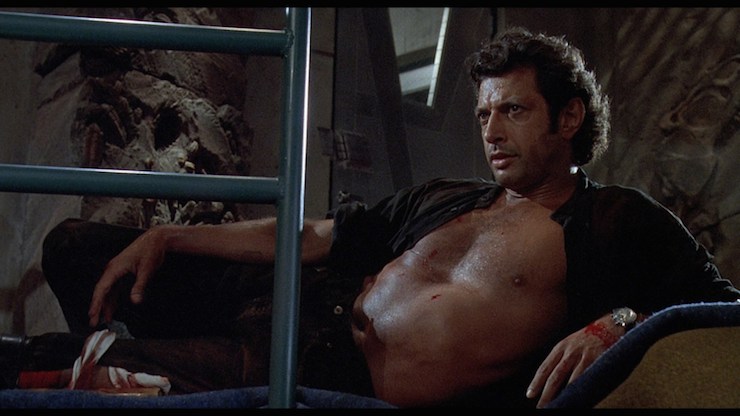
The problem lies in InGen’s arrogance, but even that can be peeled away to reveal a core of well-meaning intentions. (It’s not an excuse for anything that occurs, but it does make the journey more interesting.) John Hammond’s access to unlimited wealth is a problem not because he is greedy—like most of the periphery characters concerned with money—but because he is incapable of using that money wisely. His mantra throughout the film is that he “spared no expense” in creating the park, indicating that he believes money solves every problem. But he neglects to go by that mantra in the one place where it counted (Nedry) and finds himself paying the price.
Hammond’s aspirations are imperialistic to say the least (Malcolm instinctively touches on this when he rails against the “violence” of discovery as an act). There’s a throwaway line early in the film about how he has another theme park of some sort in Kenya, and he’s now moved on to land in Costa Rica for this particular project. But that instinct of unwelcome expansion comes clear in his conversation with Dr. Sattler, when he tells her about the first amusement park that he created once he’d left Scotland, a miniature imagined flea circus. As he grows impassioned his flawless English accent slips, revealing the Scottish brogue underneath, and we see that this man is all mask. The John Hammond that we perceive is a persona, one carefully cultivated as he worked to attain his status among people whom he likely felt inferior to. It puts his actions into perspective; his showmanship and fascination with spectacle, his desire to be philanthropic (wanting everyone to be able to visit the park regardless of means) while simultaneously taking land and scientific innovation and technology that he doesn’t understand for his very own and using it however he sees fit with no regard for secondary opinions.
It is up to Grant and Sattler to show Hammond where he has gone wrong (while Ian Malcolm is right, he’s too much of a “rock star” for Hammond to respect), and what makes them fascinating in those roles is the fact that they’re essentially billed as throwbacks. Neither one of them would have put on a lab coat and helped all the excited young geneticists piece together these species as living organisms. The same can be said of Mr. Muldoon, the park’s warden who came over from InGen’s Kenya site. These are people preoccupied with an older manner of exploration, imbued with reverence and respect for life despite professions that might not suggest so on first glance (digging up ancient bones and being an expert on game and hunting). At first, Grant uses that knowledge and reverence to frighten the kiddies—the boy hanging out at his dig for one—but he comes to realize that he can pass that reverence onto another generation via Lex and Tim; a new generation that hopefully won’t make the same mistakes that the current one is making.
And in the end, nature gets the last word. It’s so essential that the humans in this film don’t truly rescue themselves: when the raptors have Grant, Ellie, and the kids surrounded, it’s the T-Rex’s need for dinner that saves their lives. Not human ingenuity, but life finding its way, as it always will.
It would be remiss not to mention that most the things discussed here were changed as the film was going into production; Hammond was originally going to be just like his book counterpart, but Spielberg wanted him rendered in a more kindly light, relating to his love of showmanship. Grant’s change of heart about the kids was built into the script. Originally, the T-Rex didn’t show up at the end and human know-how saved the day—Spielberg had the big girl added into the finale because he considered her to be the film’s star. Change these things up and you have a different experience. We would have watched a different movie.
But as I said, we were ready for Jurassic Park… and life found a way to deliver it. And at over two decades old, it has a panache that films twenty years its junior can’t touch.
Emmet Asher-Perrin cannot believe that movie was going to end without the T-Rex eating some raptors. You can bug her on Twitter and Tumblr, and read more of her work here and elsewhere.










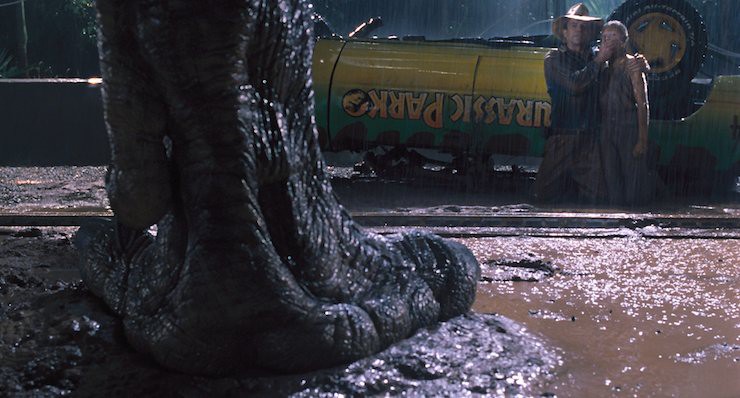
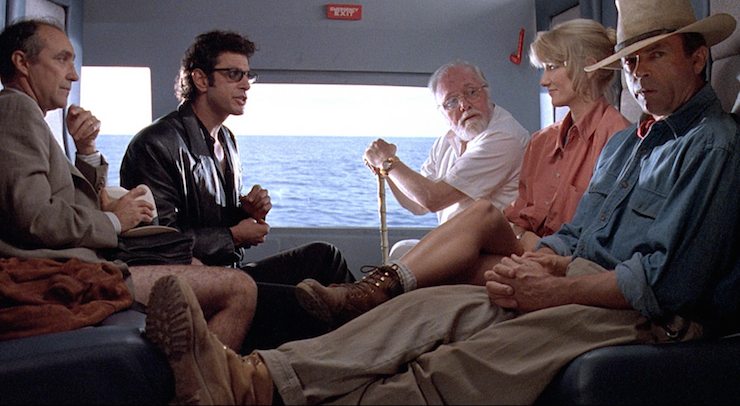
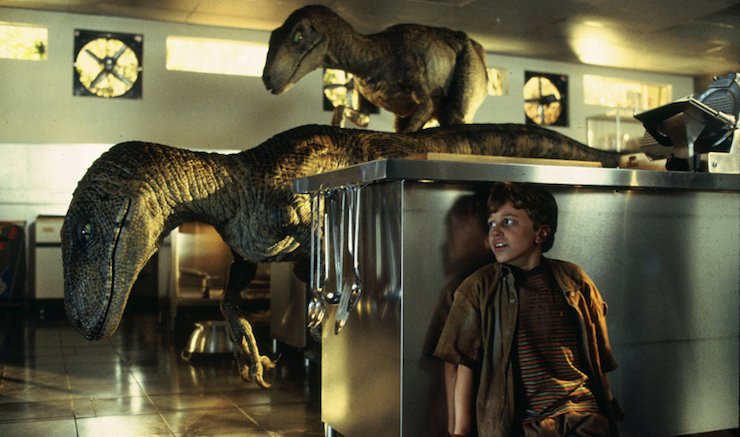
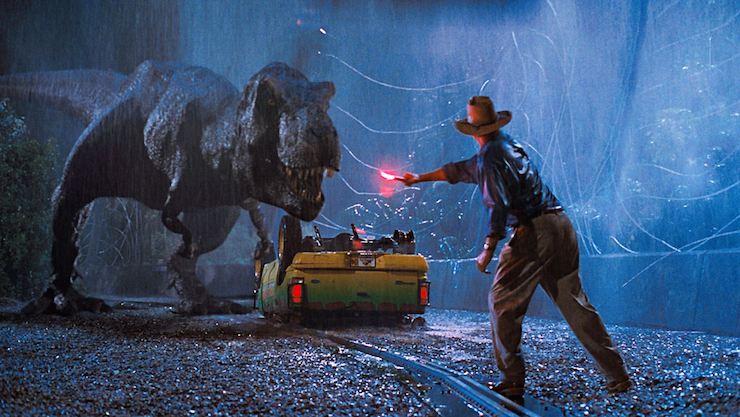
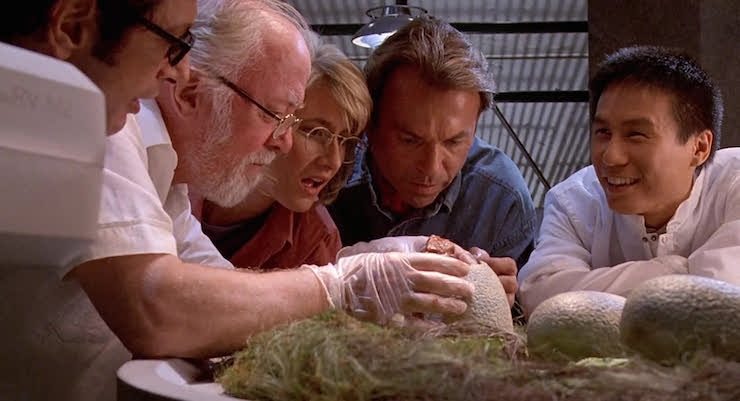
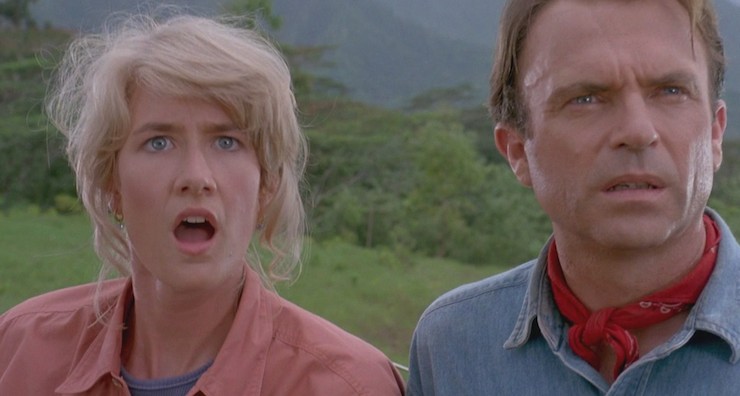
I love everything about this essay :)
We’re probably of similar age so this movie also hit at exactly the right time in my life to make a huge impression – but I do remember watching it again years later, as an adult, and being impressed with how good it still was, and how suspenseful it was WITHOUT being incredibly gory. The scene in the kitchen still puts me on the edge of my seat!!
It also has one of my favorite quotes, which is the one about being so preoccupied with whether or not you CAN do something, that you don’t think if you SHOULD do it. Sometimes I kind of forget that profound gem comes from this movie, lol. But I think you’re right, it’s a very clever movie.
My sister was obsessed with it for years; she’s 13 years younger than I am but my dad showed it to her as a little kid (probably to little – she was 5) and for year sand years she would write and illustrate books about dinosaurs. My husband did try to show it to our toddler son at one point but did NOT shield him from the opening scene (in his defense, he forgot about it) and so…you can imagine how well that went down.
Everything combined together to make a great and memorable movie. I was a teen when it came out and remember going to see it in the theater. I had read the book so was hoping that the movie would be as good as the book. And I wasn’t disappointed in the least. And the soundtrack can’t say enough about it. Love love love it. Andmust say I really enjoy all the posts by you and your take on things Emily .
Shortly after the movie came out, the office where I worked was remodeled to be more accessible. One of the changes involved replacing all doorknobs with door levers. I objected to my boss, “But that would leave us defenseless in the event of a velociraptor attack!” Alas, we had to bid farewell to those safe, safe doorknobs.
When our toddler was able to open doors with levers, we celebrated that he was now as smart as a velociraptor.
There are definitely parts of that movie that have become embedded in cultural consciousness (I still get a bit edgy if something causes my drink to start vibrating…)
The only thing that could make this movie better is an after credits scene of a man biting into a piece of pie. “SHAVING CREAM?”
Emily,
Nicely written. I also like that Laura Dern stays who she is & is as important as the rest of the cast throughout the movie.
I loved Attenborough in this; but then I’d liked him since “The Great Escape.” Good catch on his ‘less posh’ accent coming through.
I do have to take affront with your ‘pretty young kid’ comment; if only for the fact that I wasn’t when this came out. ;-)
I do agree about Williams’ score & shudder to think what movies for the last 50 years would have been like without him.
@4Lisamarie, same here. And forget the send up in Toy Story II when Rex tried to catch up to the other toys when they were in Al’s Toy Barn.
Kato
PS – I always thought that Nedry (aka Newman) had gone to the Hammond well one too many times & that was it. Plus, who didn’t want to see Newman eaten by dinosaur? No? Just me? Well then.
I’m just going to say “Dinosaurs+The Digital Special Effects Revolution+A couple decades worth of fresh Dinosaur science” and leave it at that. And note that the new movie is already an abject failure for not including the last couple of decades of science.
People did know how to make movies back then, didn’t they? I’m going to take this as evidence that I’m not just a crotchety old person saying, “Blargh! In my day movies used to be interesting and have plots and stories, instead of just being a non-stop action buffet!”
@7
Abject failure to be a hard science fiction movie? Since when? The JP movies have always been first and foremost monster movies, with some shaky scientific jargon to make it sound plausible. I don’t think we should ever expect these things to reach Kubrickian heights when people say things like “Hold on to your butts.” That’s JP in a nutshell. Feathers be damned.
@8 LOL! I took my kids to see this movie. I loved it then, and I still love it.
When I first saw this movie I thought it had some great moments, but felt that there were some holes in the plot that kept it from being a great movie. Chief among them was everyone jumping into a boat to escape an island during a tropical storm (which is the opposite of what people do in the real world). But over time, it has grown on me, and it is now one of my favorites. The scenes with the dinosaurs, and the way the characters reacted to those dinosaurs, were beautifully handled. The interactions of Grant and the kids gave the movie a lot of heart, and it was nice to see the movie makers portray the deep friendship he had with Sattler, without feeling a need to give the movie the obligatory romance.
The Mrs. and I were just discussing Jurassic Park in relation to us discussing going to see Jurassic World this tomorrow.
Ms. Asher-Perrin hits on several of the reasons that JP has held up as well as it has, but she misses one that I think is also important. JP does not follow the now-standard formula for summer blockbusters and monster movies. We don’t see the dinosaurs until about 30 minutes into the movie, and the “villan” doesn’t appear until an hour in when the T-Rex tears through the fence. Even leaving aside how the characters in the movie are having an actual philosophical discussion throughout, the pacing of JP and how well Spielberg builds the tension JP’s “uniqueness” as an intelligent summer blockbuster popcorn monster movie is what makes it work so well.
If you’ve ever read a Crichton novel, you know he has great ideas. Great, dry, exposition-filled ideas that do not make for movie bedazzlement without some tweaking.
Which has made for some awful movies made out of really good books. “Congo” and “Eaters of the Dead” (made into “The 13th Warrior”) are prime examples. Wherever “Congo” touches on science and engineering that I know, or someone I trust knows, it got it right. Dad was a photogrammetrist and edited “Photogrammetric Engineering and Remote Sensing” magazine so he knew that part inside and out, and he said that Crichton got that right.
Interesting how times have changed – last year’s geek tempest-in-a-teapot (well, one of them…) was how late, and how little, Godzilla was shown on-screen in the new film. It seemed like people just wanted two hours of G-man reprising Jonathan Coulton’s “I Crush Everything.”
It’s worth pointing out that Phil Tippett did not lose his job as a result of the CGI; in fact, he and his team did the CGI animation, using the same techniques they used for stop-motion, except that the articulated puppets they manipulated had joint sensors that fed their poses into the computer. So while the technology was different, the “performances” were created in essentially the same way by essentially the same people who would’ve done it if the film had used stop-motion.
Also, people give the CGI far too much credit. Because Spielberg expected to have to use stop-motion, he planned the production to rely as much on live-action animatronics and puppetry as possible, with animation used only for the small number of shots that couldn’t be done live. So the vast majority of the dinosaur shots in the film look real because they are real, because we’re looking at Stan Winston’s incredibly lifelike animatronic creations photographed live on the set and actually interacting with the cast. The CGI was just for stuff like full-length shots of walking, running, or jumping dinosaurs, or for huge things like the sauropods. So yes, this movie did establish CGI as a viable technique for realistic FX, but Stan Winston deserves far more of the credit than he’s given. And it’s a shame that Hollywood today has mostly abandoned animatronics in favor of CGI even though animatronics technology has continued to advance and become even more lifelike.
I sobbed like a baby when I first saw Dr. Grant meet the brachiosaur. All these rewatches later, it still makes me goozy.
Am I the only one who sees the persistent theme of the unanticipated variable throwing a monkey wrench into human plans? Just one example: Dennis Nedry has a precisely planned scheme for betraying his employer, and then it rains. He literally dies because it rains. There are tons of others. Maybe I’m reading something into the plot that wasn’t there… I dunno.
Watched it again last night with my kids. Two things jumped out at me not mentioned in the very nice article here. First, the tribute to/reprise of “Raiders of the Lost Ark” in the car-down-the-tree scene, which was wonderfully well done (*cough* J.J.Abrams could take a lesson there *cough*). And second, how the humility before nature theme did NOT get tied to anything trendy/faddish, which at the time might well have been the dangers of global cooling.
And yeah, that Williams’ score was just perfect.
My theory about older action movies is that it comes down to budget. It was simply too expensive to make an entire movie out of action set pieces. Jurassic Park could only afford 20-30 min or so of dinosaurs at the quality Spielberg wanted. So the action sequences had to placed inside a regular movie and used for maximum effect.
Whereas now, it is cheap enough to have an entire movie be action set piece after action set piece, and so that’s what film-makers are doing.
Cretaceous Park :)
My 5 year old son LOVES dinosaurs (as I have my whole life). About a year ago I got a Jurrassic Park game for the iPad. I was playing it with my son and he asked why is was Jurrassic Park since it had SO MANY Cretaceous dinosaurs in it. He thought it should have been called Cretaceous Park.
This movie came out when I was 14 or 15 and had obsessively reread Crichton’s book. I loved the movie, though I was disappointed to not see T-Rex swimming or to see the Pteradactyls attack Grant and the Kids.
I also recently rewatched the film and I was amazed at how well it has stood the test of time!
I still remember walking out of the theater for Jurassic Park thinking, “where did Spielberg get the dinosaurs?”
Exactly how I feel about that masterpiece.
Best essay on Jurassic Park I ever read. Thank you!
Dinosaurs.
Personally I’ve never been able to get over the sheer stupidity of recreating long extinct apex predators, really, really big and really, really hungry apex predators. I mean seriously, rule of cool aside in what world is this a good idea? Okay maybe if we had a whole spare planet for them….